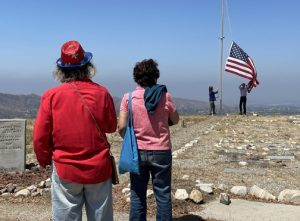
Photo by Mary O’KEEFE
Korean veteran reads a long held letter written to an Army buddy.
By Mary O’KEEFE
On Monday a small in-person Memorial Day ceremony was held at Verdugo Hills Cemetery in Tujunga. The old cemetery seemed an appropriate place of remembrance for those who had made the ultimate sacrifice while serving their country.
Craig Durst, who has dedicated so much time to keeping the Verdugo Hills Cemetery and its history alive, organized the ceremony. There are many veterans who were buried at the cemetery, and Durst thought holding a Memorial Day ceremony would be a good way to honor them.
The cemetery has fallen to ruin due to many years of neglect but Durst, and his strong band of volunteers, have made it their mission to protect this historical place. One of the needed repairs was to the flagpole that sits at the top of a hill near the cement slab that was once the area where funerals were held. With the flagpole repairs completed Durst said it was time to hold the event.
“I wanted to do something for Memorial Day,” he said.
Durst had previously spoken with Lloyd Hitt, a veteran of the Korean War, about a man named Richard White with whom Hitt had served. Richard did not make it back home.
“I thought about Richard many times after [our talk],” Durst said.
Richard White was born in El Paso, Texas in 1935. His remains were returned there after he was killed in Korea.
Hitt did not know where Richard was buried so Durst began a search that led him to a military cemetery in Texas. He was able to contact a representative at that cemetery and she virtually joined the Memorial Day ceremony. Hitt was given the phone and spoke as if directly to Richard.
Hitt told Richard of his life as he continued in the U.S. Army. He became a leader in S-2 Unit, which is the unit that manages security. He spoke of Pork Chop Hill, an area in the Korean peninsula where there were extended battles and where they both served.
“We always got along,” Hitt said as he was talking to “Richard.” “You used to tell me about your family.”
He spoke about a letter he had written to Richard after his death, long after Hitt had returned to the states. Richard remained in Hitt’s heart over the years.
“It seems a lifetime since we spoke for the last time on that morning of July 10 of ’53 and I have never forgotten,” the letter begins. “You gave me the cot next to yours and then made me your assistant gunner. Your quiet confidence gave me confidence.”
President Harry Truman’s Executive Order 9981 ordered the integration of the military, and the Korean War was one of the first times the military units were integrated. Richard was Black, and Hitt said that, in 1950s America, Black, White and Hispanic neighborhoods were separate. He had not known any Black people but for him integration was positive.
“I never saw any fights,” he said. “In boot camp we were integrated. A lot of our officers were Black.”
Richard had taken Hitt under his wing from the moment he arrived in Korea.
“Richard had a lot of experience. He had been there at least six months before me,” Hitt recalled.
“The machine gun bunker was small but you made it like home with your rosary hanging and your stationary propped up. I often think of our long nights in our bunker,” he wrote.
The tripod for the unit’s 30-caliber gun had been damaged and Richard told Hitt to keep an eye out for one.
“Later at the top of Pork Chop Hill I spotted a tripod on the side of the road. As I went to retrieve it two mortar rounds came in and I hit the dirt,” he said.
Hitt took shrapnel to his arm and shoulder. A medic ordered him to the medical bunker.
“I should have been next to you that night, feeding your machine gun; instead I was in the hospital. I should have been there to support you when a direct hit on your gun position destroyed you that night,” he wrote.
That was the night Richard had been killed – July 13, 1953, just a few days prior to the signing of the Korean Armistice Agreement and just two days shy of his 18th birthday.
Hitt finished his letter: “Richard, I will always remember you and have not forgotten your sacrifice. Perhaps one day we can relive old times. Your friend, Private Bill [Lloyd] Hitt.”
Durst continues to raise funds for the cemetery repairs. For those interested, there are a few ways to help this project, which is in need of funds and support. People can help by donating money. Checks can be made out and mailed to Little Landers Historical Society, P.O. Box 203, Tujunga, California 91043. Please write VHC (Verdugo Hills Cemetery) 100 in the check memo.
People can also help by volunteering. The second Saturday of every month from 9 a.m. to 3 p.m. is a cleanup day at the Verdugo Hills Cemetery. The next one is Saturday, June 12. Parking is limited so carpooling is advised. The VHC is located at 7000 Parsons Trail Road in Tujunga.
